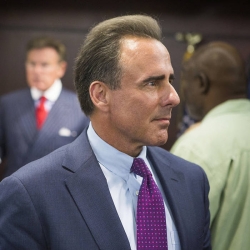
If the Casino Control Act’s ban was overturned, executives from Caesars Entertainment (pictured), MGM Resorts, and Hard Rock International could become AC politicians.
New Jersey Gov. Phil Murphy’s administration released the state transition report this week, which gave a detailed plan for how Atlantic City should regain control over its own finances from the state. One of the recommendations suggested a repeal of a 40-year old state law that prohibits members of the Atlantic City government from being employed by casinos.
The Casino Control Act of 1978 set down restrictions against casino executives actively serving in the Atlantic City governing body. The idea was to keep casino influence out of citywide politics. At a time when New Jersey had passed pro-casino legislation only two years prior, it was a sensible precaution.
In 2009, the Casino Control Act’s ban on casino executives were loosened in some ways, but tightened in other regards. Then Gov. Jon Corzine signed a bill which gave an exception to the Atlantic City government for all members but the mayor. Only the mayor of the city could not hold casino employment at the time they took office.
The 2009 bill also carved out an exception involving political contributions. A high-level casino employee who ran for city government could donate to their own campaign. Once again, at a time when the Global Recession was at its worst and Atlantic City faced years of economic uncertainty, it was deemed wise to increase AC casinos’ stake in the city’s future.
New Jersey Conflicts of Interests Law
Few casino employees have ran for Atlantic City office in the years since either provision was enacted. The language to certain clauses of the Conflicts of Interests Law make the situation murky, so it is uncertain whether New Jersey state law prohibits employees from holding city office or not.
The state thus has two contradictory laws. The Casino Control Act no longer bans casino employees from holding most Atlantic City government positions. The Conflicts of Interets Law enforces just such a ban. The dual interpretations have not been challenged in court.
The Case of Lorenzo Langford
Former Mayor Lorenzo Langford, who held a casino employee license, was elected to the AC City Council in 1992. Langford forfeited his license upon taking office, so the laws were never challenged in court. Lorenzo Langford was mayor when the 2009 Corzine amendment was signed into law.
Van Drew, who is running as a Democrat in the 2018 midterm elections, said he views the restrictions on civic participation as pointless. According to Drew, if someone is a longstanding resident of Atlantic City in good standing with the law, there is no reason to restrict their ability to run for office.
In the mind of the Democrats’ candidate, as long as the electorate is aware of a casino employees’ or executives’ status, then voters should decide on who attains office. Van Drew said, “Our intent was to increase the size of the pool of people who run for office. More active participation is always a good thing.”
Jim Johnson Supports Provision’s Repeal
Jim Johnson, the state overseer of Atlantic City’s finances, said he agrees with Van Drew. Speaking on behalf of the New Jersey Department of Community Affairs, Mr. Johnson said, “I think the restrictions help cement a barrier between the industry and the community. If community members don’t want a casino employee on council, they can resolve it at the ballot box.”
When asked for a clarification of his stance, Johnson said, “I do believe casino employees who live in Atlantic City should not be barred from running for all offices or being employed at a casino while holding office.”
So far, few public figures have disagreed with Johnson and Drew’s assessment. Steve Norton, a former Atlantic City executive who sat on the committee which drafted the Casino Control Act, said the ban on executives running for office is a relic of the past.
Steve Norton on Casinos’ Image
When asked by The Press of Atlantic City for an explanation of the law and his stance on its continuance, Steve Norton said, “In those days, casino was a bad word. We erred on the side of being overly conservative.”
Casinog gambling had a bad reputation in the late-1970’s, not least of which because casinos were still associated with the American mafia. That image is long gone, while casinos are seen as legitimate businesses throughout most of the world. Norton, who remains a consultant for casinos companies to this day, added, “The attitude (about casino gaming) has changed all over the world. People realize it’s a business like any other.”
